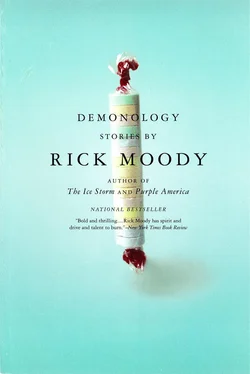Did she say the next words before acting, on the roof, in fresh moonlight, words that had to do with kissing a complete stranger from a different economic class and ethnic heritage on the roof of a known drug location, while the guests for her party were amassing, or did they kiss first, words occurring like spontaneous, retroactive evocations of the riptide of subcutaneous wishes? Where did the thought come from, in this furnace of retrospection? What made her do these incredibly stupid things? Because she’d been hung up for so long, out in front of the building, and was just grateful, at last, to have gotten her ass indoors? Or was it some quality in Angel himself? Wasn’t there a moment when she’d thought about it and realized that this might not be the smartest decision she ever made? No. Things had been connected together, conjoined. There was no fulcrum with which to pry them apart. This was part of what had come before. How blissful not to have to make a particular decision but to yield to what was already as obvious as if it were mixed up with propositions of physics. She thought, or she said aloud, Let me kiss your spectacular Caravaggio mug, and she knew that he knew they were going to kiss too, like candidates for elopement; the kiss was unclear as a romantic gesture, but forceful as an observation on the nature and duration of the month of October and what the end of October meant: onslaught of holiday madness, mixed precipitation, folly in the street, We’re young! We’re beautiful! We’re supposed to make out! He held her off. Let’s get over the fence.
Barbed wire, rusted by age and emissions of sulfurous compounds, separated her building from the known drug location. Coiled above the flush edges of the two buildings, bolted into cement. Remorseful visitations of conscience implicit in the difficulties of barbed wire. But these visitations of conscience didn’t last very long. Angel (real name Mike) seemed, of course, as if he was made to go over barbed wire, which was a generalization on M. J.’s part about things she didn’t understand, to which people who had a lot of stuff were given in the consideration of those who didn’t have as much. Nevertheless, Angel simply found a spot that was well traveled, and he pulled some heavy work gloves out of the pockets of his windbreaker, set them down, took off his windbreaker, tossed it like a proverbial cape so that it draped on the fence, gripped the fence in work gloves, vaulted over. Plucked the jacket from the barbs. Now the fence separated the two of them.
— I can’t go over that, M. J. said.
What about the party? What about the people gathered in the street outside? What about her career as a dancer? Did she want to marry? Did she mean to procreate? Had she been a good friend to her good friends? Had she attempted to remember the kindness of parents, for whom she was an only child? Had she taken in stray pets? Given to charity? Looked for the good in others?
— I’ll lift you over, Angel said.
— You weigh about ten pounds more than I do.
— No problem.
— You can’t.
He stood at the spot where he had climbed over himself. The barbs were speckled with gouts of blood. Maybe it was the light. Blood of the fiscally challenged, blood of laborers, blood of suffering addicts who flocked to the known drug location. While their wives or parents slept, when the attention was off, they came up Madison Street, incanting, skulking, sweaty, desperate, to 619 Madison. They banged upon the door. They didn’t own enough layers to put off the cold. It was no fashion statement. Angel reached out his arms. She didn’t have much faith. She climbed up on the ledge that separated the buildings, and with an expressive saltation, a frisson, she landed in his hands, arms around his neck; she could smell him now, and he smelled funky, like a human, and up close she could see the planes of his cheeks, hairless and boyish. It was true. He could lift her up. She was air, she had perfected the designs of the universal choreographer and made her body insubstantial like a bird’s, A bird is a messenger of death for people who have nofeeling. There ought to have been even more splashy lifts and embraces, but instead the sequence culminated predictably. That is, her black miniskirt became entangled upon barbs, and there was the shredding of fabric giving way, a sliver of her miniskirt, and her tights too, and then she felt the sting of it, the barb, and she thought about her immodesty, her exhibitionism, about tetanus. That skirt was expensive. He put her down, she touched herself on her thigh, with the shyness that had overwhelmed Anthony at the apperception of his sprained ankle, What was she doing here? She recognized, on her own roof, a dismal arrangement of browned spider plants and expired geraniums irresolutely tended here by the cat lady up on the third floor. M. J. was bleeding.
And he was all over her, suddenly. His brutish hands upon her caressing. There were endearments, You are the prettiest girl I ever seen. Never kissed any blond girl before, so pretty like you. His hands like sandpaper, like a hasp. The excesses of a Manhattan skyline, at this remove, like a Big Bang inconceivably past; a blanket had been thrown over something more perfect, of which the stars were an indication, perforations of night. What was the thing that endeared Gerry to her, back when he still endeared himself, and why were endearments of people she loved so inaccessible? Objects always stood in for what was missing, a certain slutty color of nail polish that he bought for her one Passover that she had never worn, but which she kept at hand. Objects were like orange traffic cones on the right shoulder of the highway of intimate relations. That’s why she was here on the roof, with a Hispanic boy in his late teens kissing her neck in a way that was sort of unpleasant now that she was thinking about it. It was hasty, not like the long, slow tentative daubs that Gerry favored.
— Hey she said. — Slow down, okay?
He was pushing down the strap of her silk blouse, trying to get at her breasts. Maybe it was romance, and maybe romance was exactly like the dance, maybe its gestures were that familiar, that immutable, even if everyone felt that they arrived at these gestures through their own impulsive ramble. Maybe the arabesques, the fouettes, the plies of dance could be superimposed on love; maybe these gestures of dancing were just love in a deconsecrated space. The way a certain brushing of lips against a cheek then led to a collision of pairs of lips, the way the lips then moved toward a nipple, it was as reliable as the movements of Ballets Russes. She tried to distract herself with terms of her childhood education, maître de ballet, port de bras. She tried to think of other possible interpretations for brutishness, until a terror started to swell in M. J. Powell. It started small, as discomfort, swelled into revulsion, and then assumed the actual size of terror, which is always one size larger than its container. Maybe terror is implicit in all anonymous sexual encounters. Maybe that’s what’s good about these encounters, maybe that’s what made degradation, when consensual, effective. But she felt nausea, a faintness. He turned her around a few times as if this were a child’s game. Which direction did she face? It was wet, on the roof; there were puddles from the last storm. There was the stench of wet towels.
— Not here, please, come on.
His manual circulations upon her became more urgent. Here, on her exposed shoulder, he romanced a certain mole. Her nipple, at the summit of a faintest incline, was now exposed to the air. His hips were fast against hers.
Читать дальше












